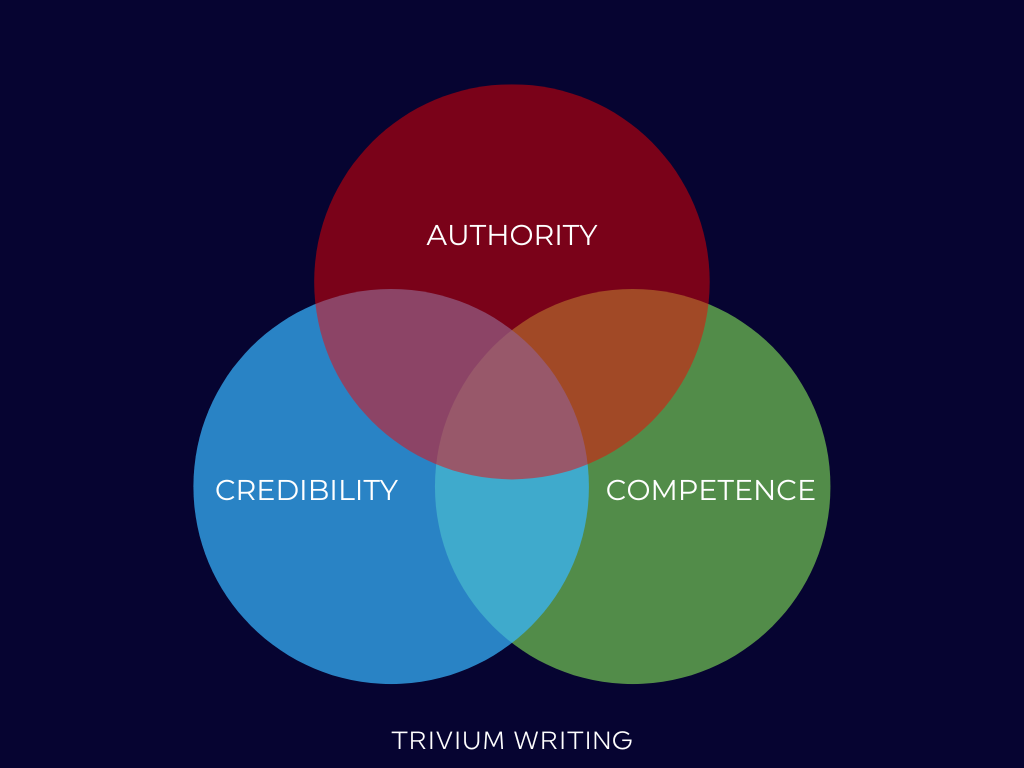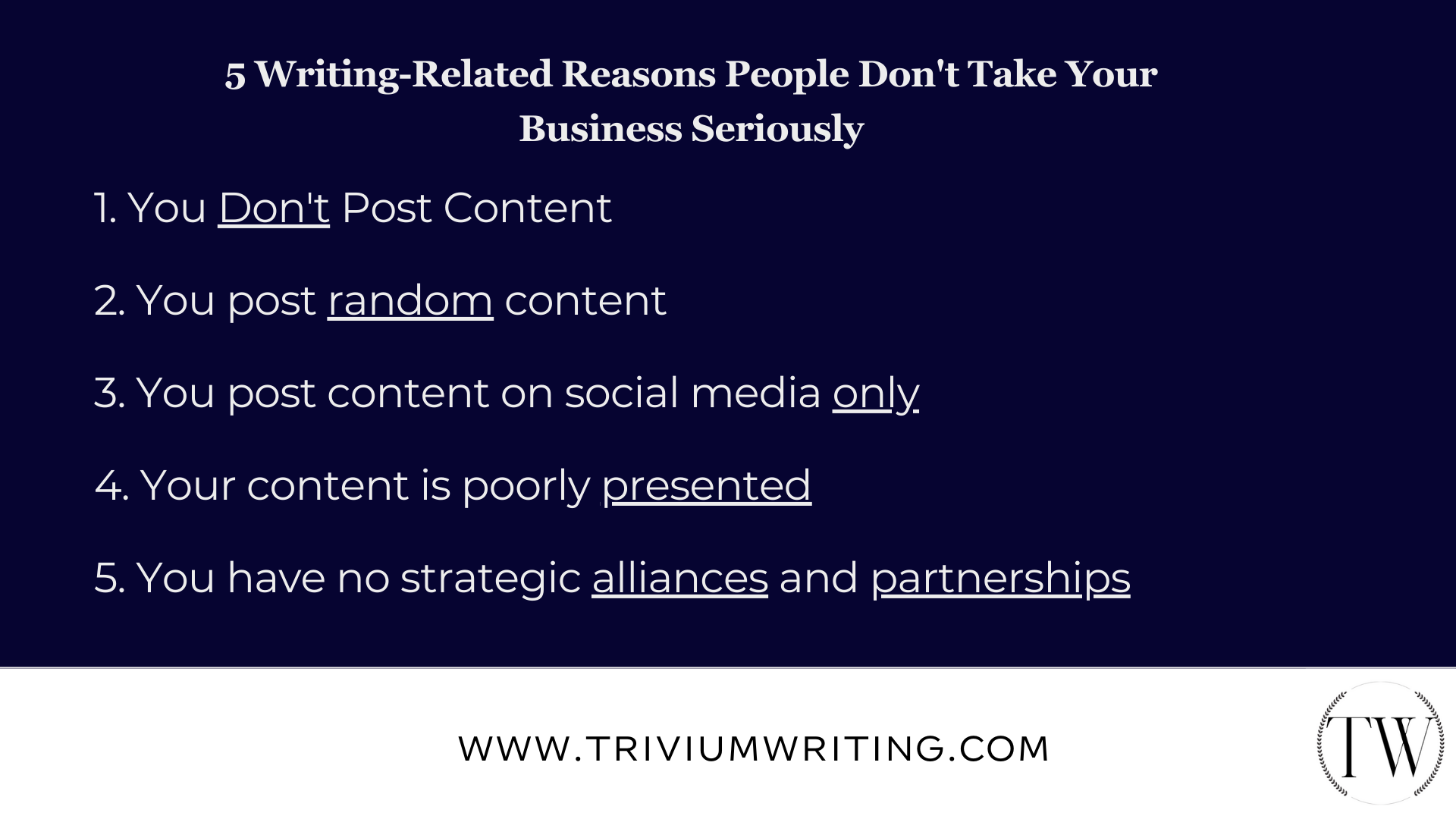5 Writing-Related Reasons People Don't Take Your Business Seriously
Being great at what you do isn’t enough if no one knows it—or worse, no one believes it.
In today’s online business environment, credibility is currency. But here’s the problem: most entrepreneurs unknowingly lose trust not because their service is bad, but because their business writing is. Whether it’s a LinkedIn post, your website copy, or the way you write emails—every word shapes how seriously people take you.
As someone who’s ghostwritten books, built brands from scratch, and helped over 130 entrepreneurs sharpen their message, I’ve seen one truth play out again and again: your writing is either building authority or eroding it. There’s no middle ground.
Why Business Writing Still Matters
In an era where anyone can launch a business from their laptop, the barriers to entry are low—but the barriers to trust are sky-high. You’re not just competing on price, offer, or niche. You’re competing on perception. And perception is shaped—first and foremost—by business writing.

We’ve entered what I call the “credibility economy.” Before people buy from you, they read you. They read your bio, your captions, your website, your comments, your emails. Whether consciously or not, they’re asking themselves: Does this person sound like someone I can trust?
Jeff Bradford said it well in Forbes:
“Good writing is fundamentally good thinking that follows a logical path and is easy for someone to follow. Writing out what you want to communicate forces you to organize your thoughts.”
If your writing is unclear, erratic, or simply absent, it signals to potential clients that your thinking—and by extension, your business—is too.

This is why improving your business writing skills isn’t a nice-to-have; it’s a strategic move. Whether you're a coach, consultant, or creative entrepreneur, the ability to articulate your value clearly and consistently separates you from the amateurs online.
Mistake #1 — You Don’t Publish Any Content
This is the most fundamental business writing mistake I see—and it’s costing talented entrepreneurs big opportunities.
If people can’t find your ideas online, they won’t assume you’re busy and booked. They’ll assume you’re not serious. In a world where your competitors are publishing content daily, staying silent makes you invisible. And invisible businesses don’t get referrals, DMs, or client inquiries.
This doesn’t mean you have to post three essays a day or reinvent yourself as a content creator. But it does mean that if you want to be top-of-mind, you need to be visible—and visibility in the digital world is built through written communication.
Here’s the good news: you don’t need long articles or polished prose to start. Short posts, emails, and even brief how-tos can build trust if done consistently. The key is writing with intention and clarity—showing your audience that you understand their problems and have something valuable to say.
Writing Coach Tips:
-
Start with 3 posts per week on LinkedIn or your platform of choice
-
Use frameworks like “Problem → Insight → Action” to stay focused
-
Repurpose content from client conversations, emails, or FAQs
-
Keep your tone professional, but don’t be afraid to show personality
In 2025, not publishing content isn’t neutral—it’s negative. Silence implies uncertainty. Your audience assumes you don’t know what to say, or worse, that you don’t have anything to say. That’s a dangerous story for your brand.
Mistake #2 — You Post Random, Unfocused Content
Publishing content isn’t enough if it doesn’t say anything that matters.
This is the second most common business writing mistake I see from otherwise brilliant entrepreneurs: they post often, but with no clear message or audience strategy. The result? Content that gets a few likes, maybe some reach—but it doesn’t build trust, drive leads, or position them as credible.
Your writing should establish you as a go-to expert. That means every post, blog, or newsletter should educate, challenge, or guide your ideal client. If your audience can’t quickly understand who you help and how you help them, you're not writing for business growth—you’re just filling space.
One reason this happens is that people don't fully understand the role of a writing consultant or what strategic writing can actually do for their brand. Instead of writing with intention, they wing it and wonder why it’s not working.
Business Writing Tips:
-
Write for your reader, not for the algorithm.
-
Focus on clarity: can someone outside your industry understand you?
-
Use strategic storytelling to build trust and show proof.
-
Don’t chase likes—chase resonance.
Let’s be blunt: posting vague motivational quotes or your breakfast pics won’t attract serious clients. Your content should reflect your competence, your understanding of your market, and your ability to deliver results.
Ask yourself: Does this content communicate authority, credibility, or relevance? If not, revise it—or don’t post it.
Mistake #3 — You Rely Only on Social Media
There’s a myth floating around the online business space that you don’t need a website anymore—just a slick social media profile and a landing page. That strategy might work if you’re selling fast-turnaround offers or chasing short-term wins, but if you’re building a sustainable, high-trust brand, it’s a huge mistake.
The truth is, relying solely on platforms like LinkedIn or Instagram means you’re building your reputation on rented land. If the algorithm shifts or your account gets restricted, your entire communication pipeline disappears overnight.
Your business deserves more than that.
A professional website, complete with blog content, service pages, and a clear brand message, signals authority. It shows you're serious. And if you're not sure how to present your message clearly, investing in editing services or consulting can elevate your content from amateur to authoritative.
On top of that, blogging is still one of the best ways to deepen trust and improve your written communication. A well-written blog post doesn’t just demonstrate expertise—it gives you long-term visibility. Unlike a tweet or post that disappears in 48 hours, a strong article can generate leads for years. Just look at how business owners are using tools like our book writing guide for coaches and consultants to grow thought leadership and authority.
What to Do Instead:
-
Build a clean, focused website with your offers, testimonials, and a clear CTA
-
Publish blog articles that reflect your expertise
-
Start a newsletter, podcast, or long-form content channel
-
Don’t write everything yourself—work with a professional if needed
If you're in business for the long haul, your content should be working for you 24/7—not just when the algorithm plays nice.
Mistake #4 — Your Content Looks Sloppy
You could have brilliant ideas and world-class experience—but if your writing looks messy, people won’t stick around long enough to notice.
This is one of the most overlooked business writing mistakes: poor formatting, inconsistent structure, and obvious grammar mistakes. In a split second, your content’s appearance communicates whether you're polished or careless—and readers often judge the value of your business accordingly.
Online, attention is currency. If your content looks like a wall of text, has weird spacing, or is full of punctuation mistakes, most people won’t even read the first sentence. Worse, they’ll assume your services are just as disorganized.
Whether you’re writing a blog post, a proposal, or even a LinkedIn update, professional writing isn't just about using correct grammar—it’s about presentation, flow, and structure. That’s exactly why tools like The Architecture of Grammar exist: to help entrepreneurs avoid common writing pitfalls and create clean, persuasive content.
Writing Coach Tips:
-
Keep paragraphs under 3–4 lines to improve readability
-
Use formatting strategically: bold for emphasis, headers for flow
-
Avoid overusing emojis or stylized fonts—it can look unprofessional
-
Always proofread, or better yet, invest in professional proofreading services
Don’t let formatting and small errors undermine your credibility. A clean, error-free presentation can be the difference between “looks amateur” and “looks like a leader.”
Mistake #5 — You Don’t Leverage Strategic Partnerships
Writing content for your own audience is great. But if you want to accelerate trust, reach, and revenue, you need to tap into other people’s audiences too.
Here’s what most business owners miss: business writing isn’t just for marketing—it's also a tool for building strategic relationships. One guest article, co-branded newsletter, or collaborative ebook can open doors that months of solo content never will.
I’ve helped clients land publishing deals, secure speaking gigs, and grow their client base simply by writing with collaboration in mind. You don’t need a huge following—you need strategic alliances and content that positions you as a valuable partner.
If you're not sure how to begin, take a page from our guide on how to write a book to grow your business. Books are powerful tools—but even shorter content, like joint blog posts or case studies, can do the job.
How to Build Strategic Writing Partnerships:
-
Identify 3–5 businesses or organizations that serve your audience
-
Offer to co-write a blog post, newsletter, or even a resource guide
-
Use writing to spotlight their work while subtly showcasing yours
-
Be the one who initiates—thoughtful outreach backed by strong writing goes a long way
You don’t need a massive marketing budget when you can borrow trust from the right partners. Use your content as a bridge—not just a broadcast.
6 Writing-Related Errors That Erode Trust Instantly
Beyond the five major mistakes we’ve covered, there are smaller—yet equally damaging—writing errors that quietly chip away at your credibility. These don’t just make your content harder to read—they make your audience question your professionalism.

Here are six common writing slip-ups that can make even a strong business look amateur:
1. Passive Voice Overload
Overusing the passive voice makes your writing vague and lifeless. Instead of saying, "The proposal was sent," write, "I sent the proposal." Clear writing reflects clear thinking—and confident businesses speak with clarity.
Want to learn how to improve this? Check out our guide on writing psychology to better understand how sentence structure impacts trust.
2. Too Much Jargon
Throwing around technical jargon might feel impressive, but it often alienates readers—especially if they’re not industry insiders. Simplicity wins in business writing. If your audience needs a dictionary to understand you, your content isn’t working.
3. Spelling and Grammar Mistakes
Yes, they still matter. A few typos may seem minor, but to a prospective client, they can raise red flags about your attention to detail. Not sure if your copy is clean? Use a grammar checker or hire an editing service to make sure everything is error-free.
4. Run-On Sentences
Long, unbroken sentences confuse readers and dilute your message. If you can’t pause and breathe while reading your own sentence out loud, your audience probably can’t follow it either.
5. No Clear Call to Action
Writing that doesn't tell the reader what to do next is a missed opportunity. Whether it’s booking a call, downloading a resource, or commenting on your post—guide your audience. Make your CTAs specific and direct.
6. Formatting Fatigue
When everything looks the same—no bolding, no headings, no visual rhythm—your content becomes exhausting to read. Use formatting as a tool to guide the eye. And for long-form writing, consider referencing our book formatting templates to keep things reader-friendly.
What You Should Do Instead
I’ve worked with over 130 entrepreneurs, coaches, and consultants to help them clarify their message, build authority, and attract higher-quality clients through better writing. And I can tell you this: the people who get taken seriously aren’t always the best at what they do—they’re just the clearest at communicating it.
So, if you’ve been making one (or several) of the mistakes we’ve covered, here’s what to do instead:
1. Treat Writing as a Business Asset
Writing isn’t just a communication tool—it’s a reputation builder. From blog posts to proposals, your content is shaping how people see you. Whether you're writing formal business documents or simple emails, take it seriously. Use tools. Hire help. Improve intentionally.
Start by reading this piece on how to improve your writing skills. Writing is a learnable skill—don’t treat it like an innate talent.
2. Build a Simple Writing Ecosystem
You don’t need to do everything. But you do need more than social media. At a minimum:
-
A professional, conversion-ready website
-
A simple content calendar (3–5 pieces/week)
-
A blog or newsletter where you go deeper
-
Clear, audience-driven messaging
Need help building that out? Explore our writing consulting services — we’ve done this for dozens of clients across industries.
3. Focus on Authority, Credibility, and Competence
When I coach clients on writing, we focus on three pillars:
-
Authority: Who you are and why you're qualified
-
Credibility: What you’ve done and the results it’s produced
-
Competence: How you do it and why it works
Write content that reflects these three things consistently and your audience will not only listen—they’ll trust you, refer you, and buy from you.
The goal isn’t perfection. The goal is clarity. Because clear writing = clear thinking = increased trust.
Start Writing Like a Business That Deserves to Be Taken Seriously
Your writing doesn’t need to be perfect—but it needs to be professional.
In today’s credibility economy, your business is judged by your ideas—and your ideas are judged by how clearly and consistently you express them. If your writing is weak, inconsistent, or non-existent, your audience assumes the same about your business.
But when you write with strategy, structure, and substance, everything changes. You attract better clients. You command higher fees. You get referred, talked about, and trusted—without needing to constantly prove yourself.
You don’t have to figure it all out on your own. Whether you want to sharpen your blog posts, improve your client proposals, or write a book that grows your authority, we can help.
Explore our consulting services or check out our writing courses to take the next step toward building the kind of business people take seriously.
The difference between being seen as a freelancer and being seen as a leader often comes down to how you write. Choose leadership.
Article by Leandre Larouche
Leandre Larouche is a writer, coach, and the founder of Trivium Writing.

-4.png)
-1.png?width=352&name=SERVICES%20IMAGES%20(18)-1.png)
.png?width=352&name=SERVICES%20IMAGES%20(29).png)
.png?width=352&name=SERVICES%20IMAGES%20(24).png)